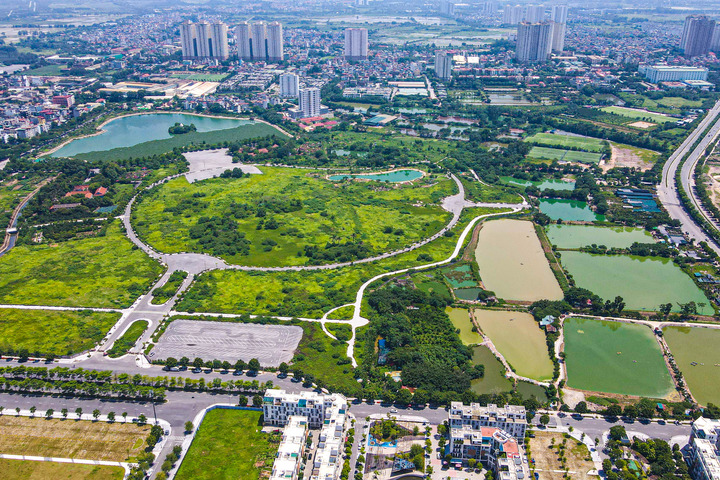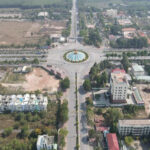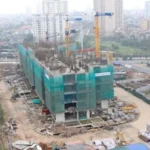The Government Office has issued Document No. 8160/VPCP-NN conveying Prime Minister Pham Minh Chinh’s instructions on addressing media and public opinions regarding the high financial obligations when changing land use purposes.
Accordingly, Prime Minister Pham Minh Chinh assigned the Ministry of Finance to take the lead, in coordination with the Ministry of Agriculture and Environment and relevant agencies, to research and propose solutions using land price adjustment coefficients to collect land use fees suitably and feasibly. A report on this matter should be submitted to the Prime Minister before September 10, 2025.
According to current regulations, when converting agricultural land to residential land, people must pay the entire difference between the two land prices instead of the previous rate of 30-50%. Along with this, the land price tables in many localities have been adjusted, causing a sudden increase in land use fees that people have to pay when converting, sometimes even multiple times higher than before. This is also a challenge for local governments when implementing the 2024 Land Law.
Many opinions also state that it is necessary to build land price tables annually and issue them for application from January 1 of each year, which will consume resources and time.

The Prime Minister requests studying appropriate land price adjustment coefficients. (Illustrative image)
Associate Professor Dr. Nguyen Dinh Tho, Deputy Director of the Institute of Strategy and Policy on Agriculture and Rural Development (MARD), said that the land price in the price table often differs significantly from the market price, leading to inconsistencies in compensation calculations and investment attraction.
Therefore, the Ministry of Finance needs to determine appropriate coefficients to calculate the financial obligations of the people. The significant discrepancy between the land price framework and the market price has directly affected the people and businesses.
In reality, in Hanoi and Ho Chi Minh City, many households have faced difficulties in changing land use purposes due to high financial obligations calculated based on the land price table. This also puts pressure on production and business costs, affecting livelihoods and the investment environment. Therefore, special attention should be paid to land finance policies to ensure that people’s financial obligations are reasonable and that there is a mechanism to support enterprises.
Earlier, on August 5, Deputy Prime Minister Tran Hong Ha chaired a meeting with ministries and sectors, connecting online with 17 provinces and cities about amending the regulations on land use fees, land rent (Decree 103/2024/ND-CP), and the Land Development Fund (Decree 104/2024/ND-CP).
Regarding the calculation of land use fees when changing the land use purpose from agricultural land to residential land, feedback from localities showed that the sudden increase in land prices has led to people having to pay much higher amounts than before.
Deputy Prime Minister Tran Hong Ha clarified the need to distinguish between those who use land for legal production and business and those who speculate, leaving the land uncultivated or slow to implement projects. For people accessing land for the first time to build houses, it is necessary to calculate the collection amount suitable to their payment ability, ensuring their benefits and realistic access, especially in rural and urban areas with difficult conditions.
How to Reduce Land Use Charges When Changing the Purpose to Residential?
The current land use charges, post-change in purpose, are calculated at 100% of the priced land rate, resulting in exorbitant fees for citizens. For instance, a 400 sq. m plot in the former Vinh City, Nghe An Province, incurs a fee of VND 4.5 billion, while a 208 sq. meter plot in Hoc Mon District, the former Ho Chi Minh City, costs VND 1.7 billion. Similarly, a 400 sq. meter plot in District 7 of the old Ho Chi Minh City will cost a staggering VND 14 billion. These charges are incredibly burdensome for landowners.
A Proposal to Reduce Land Use Fees for Residential Purposes
HoREA has proposed that in the event of a Government Resolution, the collection of land use fees when converting agricultural or non-agricultural land to residential land should be clearly specified. They suggest a reduction from 30% to 20% for land within the allocated residential land limit, and from 50% to 30% for land exceeding this limit.
Why the Additional Land Premium of 5.4%/year is a ‘Burden’ and Needs Amendments
Many businesses and organizations have petitioned against the collection of additional land fees or have requested a reduction in the annual rate of 5.4%. This move aims to provide much-needed support and alleviate the challenges faced by investors.
“Debunking Rumors: Danang Authorities Refute Land Price Surge Claims”
The Danang Department of Natural Resources and Environment has clarified that land prices have not increased tenfold, but rather have been adjusted within the prescribed scope. They assert that the claims made by residents are inaccurate and that any changes are in line with the relevant regulations.













































